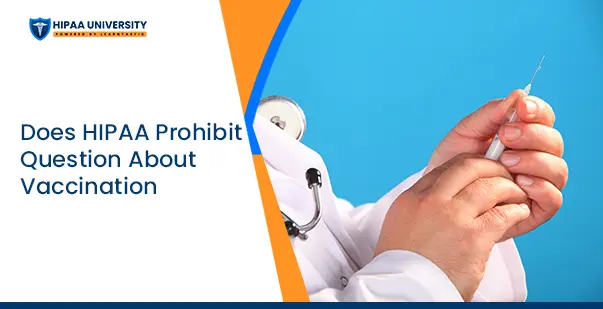Does HIPAA Prohibit Questions About Vaccination?

October 4, 2024
Table Of Content(s)
- Introduction
- Overview of HIPAA: HIPAA Law and Covid
- Is asking for proof of vaccine a hipaa violation?
- Situations where HIPAA might allow for inquiries about vaccination status
- The Impact Of Breaching HIPAA
- Future Trends in HIPAA and Vaccination Information
- Conclusion
Introduction
Health information is increasingly scrutinized and protected. But a common question remains: Does HIPAA apply to Vaccines? The Health Insurance Portability and Accountability Act (HIPAA) is designed to safeguard sensitive patient information. But how does it comply with the growing focus on vaccination? A recent study highlights that HIPAA mandates strict confidentiality. However it doesn’t necessarily prohibit discussions about vaccination status, especially in specific contexts.
Vaccination questions are frequently asked in various settings. It can be required in schools, workplaces, and healthcare facilities.
Understanding HIPAA’s role can clarify what is permissible and what isn’t. For instance, while HIPAA protects patient privacy, it doesn’t prevent organizations from asking about vaccinations if it’s relevant to their operations or public health guidelines. This balance between privacy and public health creates a complex landscape for handling vaccination inquiries.
In this blog, we’ll explore how HIPAA guidelines interact with vaccination questions. We will also provide clarity on what organizations can ask and how to navigate these inquiries without breaching confidentiality.
Overview of HIPAA: HIPAA Law and Covid
HIPAA plays a crucial role in protecting sensitive health data. The COVID-19 pandemic introduced new challenges and considerations for HIPAA compliance. The urgent need for public health information and the rapid spread of the virus led to adaptations in health data. Here’s an overview of how HIPAA interacts with the pandemic:
- HIPAA Privacy Rule: Ensures the confidentiality of patient information and limits how it can be used and disclosed without patient consent.
- COVID-19 Exceptions: During the pandemic, certain flexibilities were introduced, allowing more leeway for sharing health information to address public health needs.
- Telehealth Expansion:HIPAA regulations were adapted to facilitate telehealth services, enabling remote consultations while maintaining patient privacy.
- Public Health Reporting: HIPAA permits the disclosure of health information to public health authorities for purposes related to disease control and prevention, including COVID-19.
- Vaccination Information: Questions about vaccination status are subject to HIPAA regulations, with specific considerations for privacy and public health needs.
- Emergency Use Authorizations (EUAs): HIPAA guidelines were updated to accommodate the emergency use of vaccines and treatments during the pandemic.
- Impact on Healthcare Providers: Adjustments and temporary waivers were made to support healthcare providers in managing patient data amid the surge in COVID-19 cases.
How do HIPAA regulations apply to vaccination status?
Here’s a concise look at how HIPAA applies to vaccination status:
- Protected Health Information (PHI): Vaccination status is considered PHI under HIPAA, meaning it is subject to strict privacy protections.
- Disclosure Rules:Healthcare providers can share vaccination information without patient consent only in specific situations, such as public health reporting or as required by law.
- Workplace Inquiries:Employers may ask about vaccination status for health and safety reasons, but must ensure that this information is handled confidentially and securely.
- Patient Consent: Healthcare providers must obtain patient consent before disclosing vaccination status for non-medical purposes.
- Public Health Exceptions: HIPAA allows the disclosure of vaccination status to public health authorities for disease control and prevention purposes. This includes during public health emergencies.
- Telehealth Considerations: HIPAA regulations for telehealth require that vaccination information shared during remote consultations is protected with the same level of confidentiality.
Read More: Is Gmail HIPAA Compliant: What Healthcare Providers Need to Know
Is asking for proof of a vaccine a hipaa violation?
No. As per the Health Insurance Portability and Accountability Act, asking for proof of vaccine, doesn’t violate any law.
Situations where HIPAA might allow for inquiries about vaccination status
HIPAA regulations allow for inquiries about vaccination status in specific situations where public health and safety are prioritized. Here are key scenarios where such inquiries are permitted:
- Public Health Reporting: Disclosure to public health authorities for monitoring and controlling disease outbreaks.
- Emergency Situations: During public health emergencies, such as pandemics, to manage and respond to the crisis.
- Regulatory Compliance:Compliance with laws or regulations that mandate reporting vaccination status for certain populations.
- Workplace Safety: Employers may inquire about vaccination status to ensure a safe work environment, provided the information is kept confidential.
- Healthcare Settings:Sharing vaccination status within healthcare settings for continuity of care and to inform treatment decisions.
Read More: Who is Responsible for Enforcing HIPAA Regulations?
The Impact Of Breaching HIPAA
The Health Insurance Portability and Accountability Act (HIPAA) sets strict standards for protecting patient information. The violations can lead to significant legal, financial, and reputational damage. Understanding the impact of such breaches underscores the importance of rigorous compliance. Here’s a look at the potential repercussions:
- Legal Penalties: Organizations and individuals may face substantial fines and legal actions, depending on the severity and nature of the breach.
- Reputational Damage: Breaches can erode trust and damage the reputation of healthcare providers or institutions, leading to loss of patients and business.
- Loss of Patient Trust: Patients may lose confidence in the ability of healthcare providers to protect their sensitive information, affecting their willingness to share crucial health data.
- Operational Disruptions:Addressing a breach can divert resources and disrupt normal operations, impacting overall efficiency and patient care.
- Increased Scrutiny:Organizations may face heightened regulatory scrutiny and audits following a breach, leading to additional compliance costs and oversight.
- Legal Fees and Settlements: Significant expenses may be incurred from legal defense costs and potential settlements or judgments.
Future Trends in HIPAA and Vaccination Information
As we look to the future, several trends are likely to shape how HIPAA regulations intersect with vaccination information. These evolving trends reflect the ongoing balancing act between privacy and public health needs:
- Increased Data Sharing for Public Health: Enhanced allowances for sharing vaccination data with public health authorities to improve disease tracking and response.
- Advancements in Digital Health:Integration of advanced technologies and electronic health records (EHRs) with stricter guidelines on how vaccination information is handled and shared securely.
- Telehealth Expansion: Continued growth in telehealth services will require updated HIPAA guidelines to ensure secure handling of vaccination information in virtual settings.
- Stricter Compliance Measures:Potential for more rigorous enforcement and compliance measures to address breaches and ensure that vaccination information is managed properly.
- Evolving Public Health Regulations: Adaptations in HIPAA to align with new public health laws and regulations, particularly in response to emerging health threats.
- Enhanced Privacy Protections: Development of new privacy protections and encryption standards to safeguard sensitive vaccination data from unauthorized access or breaches.
- Consumer Empowerment:Increasing emphasis on giving patients more control over their vaccination data and how it is shared, with clearer consent processes and access controls.
Conclusion
To answer, “Does HIPAA apply to Vaccines”, it does but it has established guidelines for compliance as well. It doesn’t outright prohibit questions on vaccination status. HIPAA’s primary goal is to protect sensitive information. Therefore it provides specific allowances for disclosing vaccination status. These allowances mostly involve public health and safety crises.
Organizations and healthcare providers can inquire about vaccination status when necessary. They can do this to check compliance with health and safety guidelines. Understanding these rules help navigate the balance between safeguarding patient privacy and addressing public health needs.
By staying informed about HIPAA regulations and their applications, organizations can ensure they manage vaccination information responsibly and compliantly.


